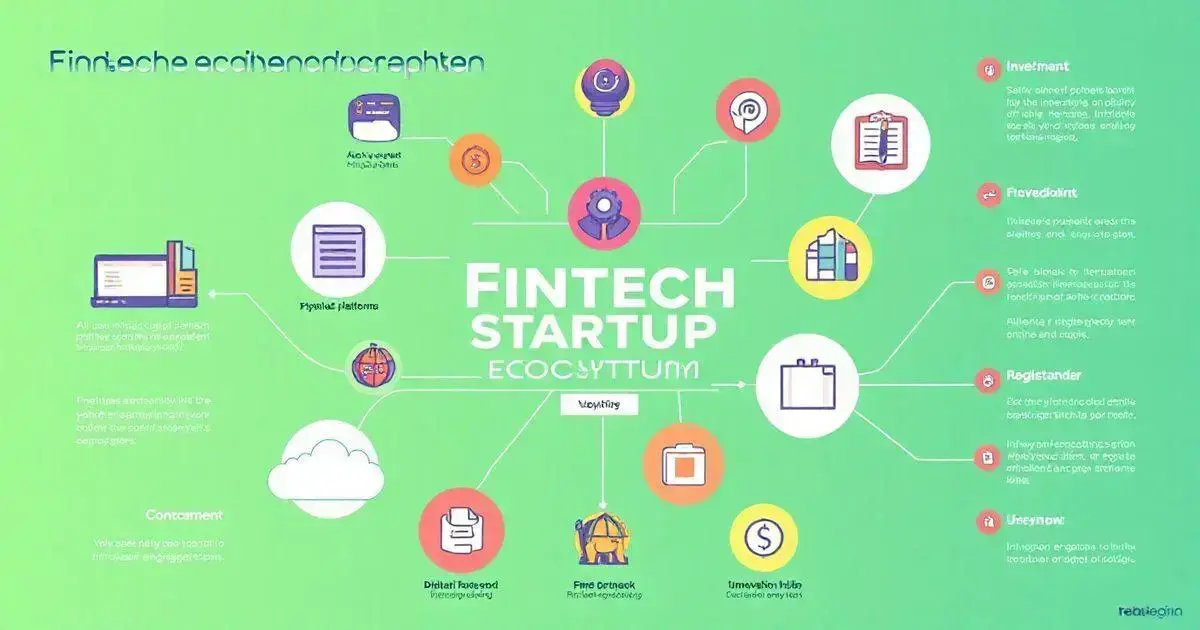The startup ecosystem is a vibrant network where innovation thrives and groundbreaking ideas take shape. This interconnected framework includes startups, investors, accelerators, and other stakeholders, all working together to drive progress.
In the fintech space, the startup ecosystem is particularly dynamic, offering revolutionary solutions that challenge traditional financial models. From mobile payments to blockchain technology, these startups are reshaping how we interact with money and finance.
Curious about the trends and opportunities in this ever-evolving ecosystem? Continue reading to uncover the key players and strategies that define success in the fintech world!
Introduction to Fintech Startups
Fintech startups are innovative companies that leverage technology to provide financial services. They often emerge in response to the limitations of traditional financial institutions, creating new solutions for payments, lending, investments, and personal finance management.
The technology used in fintech includes blockchain, artificial intelligence, and big data analytics.
These startups aim to address market needs by identifying gaps such as faster payments and access for underserved populations.
Examples of fintech innovations include peer-to-peer lending, which involves platforms connecting borrowers directly with investors, and mobile banking, which provides easier finance management apps for consumers on the go.
Security is a major concern, and fintech companies are investing in advanced cybersecurity measures to protect user data.
The impact of fintech is significant, as it is reshaping the financial services industry to be more inclusive and user-friendly.
Key Components of the Fintech Startup Ecosystem

The fintech startup ecosystem is built on various key components that contribute to its dynamic nature.
Technology plays a vital role, with innovations such as blockchain and artificial intelligence leading the charge in transforming traditional finance.
Other crucial elements include regulatory frameworks, which ensure compliance and foster trust among users.
Funding sources are essential, as they provide the necessary capital for startups to develop and scale their solutions.
Collaboration with established financial institutions often enhances credibility and reach.
Additionally, strong networks with mentors and investors create opportunities for growth and learning.
Startups must also focus on user experience, making financial services accessible and easy to use for everyone.
This ecosystem thrives on innovation, which pushes boundaries and opens up new markets, making the fintech landscape both exciting and challenging.
Emerging Trends in Fintech
Emerging trends in fintech are revolutionising the financial landscape. One key trend is the rise of mobile payments, allowing users to transact easily using smartphones.
Digital banking is also gaining momentum, providing seamless online services without traditional branches.
Additionally, robo-advisors are changing how people invest, offering automated, algorithm-driven financial planning with minimal human intervention.
Cryptocurrency continues to grow, attracting attention from investors and consumers alike, while peer-to-peer lending is creating new avenues for borrowers and lenders.
Finally, the integration of artificial intelligence in fraud detection and customer service is enhancing security and improving user experiences.
With these trends, the fintech startup ecosystem is set for significant growth, making financial services more accessible and efficient for all.
Funding Sources for Fintech Startups

Finding funding sources for fintech startups is crucial for success in the startup ecosystem. Venture capital remains one of the most common options, offering significant funding in exchange for equity, helping startups scale within the competitive ecosystem.
Angel investors are another valuable source, providing early-stage financing alongside strategic advice. Incubators and accelerators further enhance the startup ecosystem by offering funding, mentorship, and vital resources to promote growth.
Crowdfunding platforms are a popular choice, allowing startups to raise small amounts from many supporters while gauging market interest. Additionally, government grants and loans provide non-dilutive capital, a great option for startups in the fintech space. A thriving startup ecosystem requires entrepreneurs to carefully assess their funding needs and align with the right sources to fuel their ambitions effectively.
Navigating Regulatory Challenges
Navigating regulatory challenges is crucial for fintech startups to thrive in the startup ecosystem. These companies must adhere to a variety of laws and regulations, which often differ by country. Understanding licensing requirements is key, as many regions mandate specific licenses for legal operation.
Data protection regulations, like the General Data Protection Regulation (GDPR), significantly influence how fintech firms manage user data. Compliance can be intricate, but thorough research and preparation are vital to avoiding legal complications in the startup ecosystem.
Hiring experts or consulting with legal advisors ensures adherence to regulations and helps build a strong compliance culture. This not only mitigates risks but also fosters customer trust. Partnering with regulatory bodies can provide additional guidance and support, allowing startups to navigate the complexities of the startup ecosystem with confidence.
The Role of Technology in Fintech

The role of technology in fintech is essential for modern financial services. Innovations such as blockchain enhance security and transparency in transactions.
Furthermore, artificial intelligence is used for personalising customer experiences, predicting market trends, and automating services.
Big data analytics allows fintech startups to understand consumer behaviour and tailor products accordingly.
Moreover, cloud computing offers scalability and accessibility for financial applications, enabling seamless service delivery.
As mobile technology advances, it empowers consumers to manage their finances anytime, anywhere.
Overall, technology is the backbone of fintech, driving efficiency and accessibility across the industry.
Case Studies of Successful Fintech Startups
Case studies of successful fintech startups illustrate the potential of innovation in finance.
Kickstarter shows how crowdfunding can empower new ventures to launch successfully.
Another example is TransferWise, which disrupted the currency exchange market by offering lower fees compared to traditional banks.
Revolut has transformed banking with its all-in-one app that includes currency exchange, stock trading, and crypto services.
Similarly, Stripe streamlines online payments, making it easier for businesses of all sizes to accept payments globally.
By examining these case studies, we see that a strong value proposition and understanding customer needs are key factors for success in the fintech landscape.
These examples inspire new fintech ideas and demonstrate that with the right approach, startups can significantly impact the financial industry.
Building a Strong Network in Fintech

Startups can benefit from engaging with industry experts and participating in networking events to connect with potential collaborators. Leveraging platforms like LinkedIn helps establish relationships with key players in the financial sector and increases visibility.
Seeking mentorship provides invaluable guidance, offering insights into navigating challenges and seizing opportunities. Collaborating with other startups fosters innovation and creates supportive ecosystems, while attending conferences allows for the exchange of ideas and staying informed about emerging trends.
A robust network not only enhances credibility but also unlocks opportunities for funding and partnerships, setting a strong foundation in the competitive fintech landscape.
Future Predictions for the Fintech Ecosystem
The fintech ecosystem is poised for rapid growth and groundbreaking innovation in the coming years.
Artificial intelligence is expected to play a central role, making financial services smarter, more efficient, and tailored to individual needs. Blockchain technology will likely enhance security and transparency, streamlining cross-border transactions and reducing fraud risks.
The rise of open banking is anticipated to revolutionize how consumers share financial data, fostering more personalized and efficient services. Central bank digital currencies could redefine traditional banking, introducing new forms of money and payment systems. With clearer regulations, startups may also find it easier to overcome barriers, driving further innovation.
As the fintech landscape continues to evolve, these advancements promise to create new opportunities, improve customer experiences, and reshape the financial industry.
Wrapping Up the Fintech Journey
The fintech ecosystem is an ever-evolving landscape, rich with opportunities for growth and innovation.
As technology continues to advance, startups must adapt and embrace emerging trends to thrive.
Building a strong network and understanding regulatory challenges are vital for sustaining success in this competitive field.
Ultimately, the future predictions for fintech suggest a landscape marked by increased collaboration, enhanced security, and improved customer experiences.
Entrepreneurs should capitalise on these trends to create impactful solutions that reshape the financial services industry.
FAQ – Frequently Asked Questions about the Fintech Startup Ecosystem
What is the fintech startup ecosystem?
The fintech startup ecosystem refers to the network of companies, investors, and regulators that collaborate to innovate and deliver financial services using technology.
How can I secure funding for my fintech startup?
Funding can be secured through venture capital, angel investors, crowdfunding, and government grants, depending on your startup’s stage and requirements.
What role does technology play in fintech?
Technology enables efficiency, security, and accessibility in financial services, transforming traditional banking practices and offering new solutions.
What are some emerging trends in fintech?
Emerging trends include mobile banking, blockchain technology, artificial intelligence, and open banking, all contributing to a more integrated financial landscape.
How can networking benefit my fintech startup?
A strong network can provide valuable connections, mentorship, funding opportunities, and insights into industry best practices, helping your startup grow.
What regulatory challenges do fintech startups face?
Fintech startups must navigate licensing requirements, data protection laws, and compliance regulations, which can vary by region and impact operations.
What are the future predictions for the fintech ecosystem?
The fintech ecosystem is expected to evolve with greater collaboration, enhanced security measures, and the widespread adoption of digital currencies and AI technologies.
Check out our article on Finance Tools to explore essential resources for managing your money and achieving financial success.
